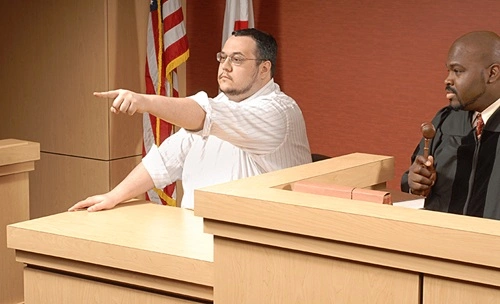Facing a criminal charge can be intimidating—especially when you’re called to appear at a preliminary hearing. Many defendants wonder: Is this the day I could be taken to jail? The answer is yes, it’s possible, but it depends on the stage of your case, the charges you’re facing, and whether you’re currently out on bail.
A preliminary hearing is not a trial—it’s a probable cause hearing to determine if enough evidence exists to move your case forward. But while it’s mostly a procedural step, certain decisions made during or after this hearing can land you in jail.
Let’s break down what happens at a preliminary hearing and when you could be taken into custody.

1. What Is a Preliminary Hearing?
A preliminary hearing (sometimes called a “prelim” or “probable cause hearing”) is a court proceeding that usually occurs after you’ve been charged with a felony.
At this hearing, the prosecutor must show that there is probable cause to believe:
1. A crime was committed, and
2. You are the person who committed it.
The judge does not decide guilt or innocence—only whether there’s enough evidence to continue the case to trial.
The prosecutor typically presents witness testimony, police reports, and physical evidence. Your defense attorney may cross-examine witnesses and argue that the evidence is weak or insufficient.
If the judge finds no probable cause, the charges can be dismissed. But if the judge finds enough evidence, the case moves to trial—or, in some states, to a grand jury.
2. Do You Go to Jail Just for Attending a Preliminary Hearing?
If you’re already out on bail or on your own recognizance (OR), simply attending your preliminary hearing won’t automatically result in jail time. The purpose of the hearing is to review evidence—not to impose punishment.
However, there are several circumstances where the judge could order you into custody during or after the hearing.
3. Situations Where You Could Go to Jail
Here are the most common reasons a defendant might be taken into custody at or after a preliminary hearing:
A. The Judge Revokes or Raises Your Bail
If the judge determines that new evidence shows you’re a flight risk or a danger to the community, they can increase or revoke your bail.
If bail is raised and you can’t pay the higher amount, you’ll be taken to jail immediately.
If bail is revoked, you’ll be held in custody until trial.
This can happen if, for example, testimony reveals that you threatened witnesses, committed another crime while out on bond, or violated release conditions.
B. The Court Finds You Violated Bail Conditions
If you’ve missed court dates, failed drug tests, or violated no-contact orders before the hearing, the judge can issue a bench warrant or revoke your release. Once you appear in court, you could be remanded to custody.
C. New or More Serious Charges Are Filed
Sometimes, during a preliminary hearing, the evidence reveals more serious criminal conduct than initially charged. Prosecutors can amend the complaint or file additional felony charges on the spot.
If that happens, the judge may decide you should be held in jail pending trial on the upgraded charges.
D. You’re Already in Custody
If you were arrested and unable to post bail, you’ll be brought to the preliminary hearing from jail. If the judge finds probable cause, you’ll remain in custody while awaiting trial—unless bail is reduced or you’re released on bond.
4. What Happens If the Judge Dismisses the Case?
If the judge finds that the prosecution’s evidence doesn’t establish probable cause, the charges can be dismissed, and you can walk free—at least temporarily.
However, dismissal at a preliminary hearing doesn’t always mean the end of the case. Prosecutors can often refile charges later if they gather more evidence.
5. How to Avoid Being Taken Into Custody
If you’re out on bail and have a preliminary hearing coming up, here are steps to minimize the risk of being jailed:
Follow all bail conditions strictly—no missed check-ins, no new arrests, and no contact with victims or witnesses.
Arrive early and appear respectful in court. Judges take behavior seriously.
Stay in close contact with your attorney. They can anticipate whether the prosecutor might request bail changes or new charges.
Bring documentation (employment proof, community ties, etc.) to show you’re not a flight risk if bail becomes an issue.
Your attorney can also argue against detention by highlighting your cooperation, clean record, or ties to the community.
6. What Happens After the Hearing
If the judge decides the case should proceed, you’ll be “bound over” for trial in a higher court. Depending on your custody status:
If you’re already out on bail, you’ll remain free until the next court date.
If your bail is revoked or you’re denied bond, you’ll stay in jail until trial or a bail review hearing.
It’s also common for plea negotiations to happen soon after the preliminary hearing—sometimes even resolving the case before trial.
7. Final Thoughts
So, can you go to jail at a preliminary hearing? Yes, you can—but it depends on your situation.
If you’re already out on bail and following court orders, you’ll likely walk out of the courtroom the same day. But if you violate bail conditions, face new or more serious charges, or if the judge deems you a risk, you could be taken into custody on the spot.
A preliminary hearing isn’t about guilt—it’s about whether there’s enough evidence to move forward. But it’s also a critical moment where your freedom may be on the line. With an experienced criminal defense attorney by your side, you can protect your rights, challenge weak evidence, and reduce the risk of being taken to jail prematurely.

Our dedicated team gathers information from all the reliable sources to make the law accessible and understandable for everyone. We provide the latest legal news stories from across the country, delivered straight to you.
